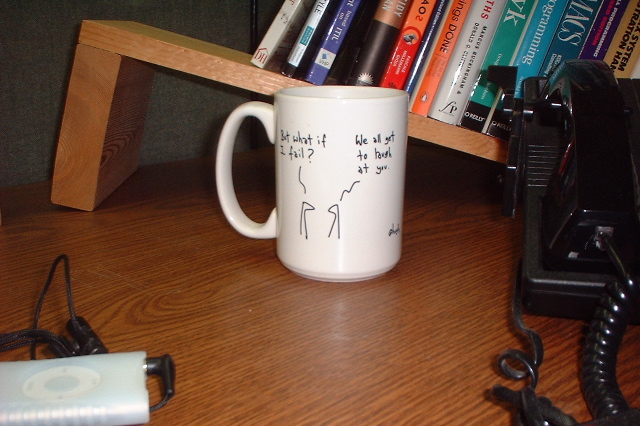I came across references to The Dip, by Seth Godin while reading an entry on GapingVoid, a blog by Hugh Macleod, the book's illustrator. The cartoon in question spoke volumes to me since at the time, I was in the dip phase of my current gig at work.

Since Hugh's licensing terms are "pretty open", I have this cartoon on my wall at work (cube art) and also on a really nice coffee mug from Cafe Press.
The premise of the book is very simple (Even Seth confesses that.): Real winners, those who are the best in the world at something, quit often. And frequently. And early. And without remorse. The idea is that by quitting the wrong things, projects, jobs, etc. early and often, we save ourselves from dead-end tasks and focus on those that we can emerge as the best in the world in. Seth does define the term "the world" in rather limited ways; it can be so small a group as to be nearly meaningless (e.g., this is the best book I read yesterday) or as vast as the cosmos (e.g., of all the books I've ever read . . .).
The "dip" itself is that period of time, of low energy, when/where we want to quit what ever it is we are doing. When the going gets tough. Mile 20 of a marathon. The third week of a new job. The seventh year (I'm told) of a marriage. The trouble is, we've invested a ton of energy/money/time/emotion into whatever-it-is up to this point. So if we're going to quit now, we should have never started. And unless we're willing to put in the energy/money/time/emotion/etc. to be the best-in-the-world, we should never have started. The "dip" is a barrier to entry in that market. It's what keeps the other competitors to your title of best-in-the-world away. So if you really wish to be the best in the world at whatever you're attempting, you should keep going.
Much of the book is conventional wisdom. Or common sense. Jesus tells us to "count the cost". Lucy tells Mr. Tumnus that he's the nicest faun she's ever met, to which he responds that she's had a rather poor sampling (he's the first she's ever met, i.e., small-world problem). The book The Discipline of Market Leaders: Choose Your Customers, Narrow Your Focus, Dominate Your Market tells us much the same things. GE and Welch tell us to get out of any market that we can't be #1 in. We're spending too much time on things we can't excel at. Seth asks us (pg 23) if we "have the guts to pick a different, smaller market to conquer?"
The Bard reflects that we must
See first that the design is wise and just: that ascertained, pursue it resolutely; do not for one repulse forego the purpose that you resolved to effect. (emphasis mine)
Maturin observes (on page 85 of The Letter of Marque) that "He who wishes to grow rich in a year, will be hanged in six months." Seth tells us that it is easy to be rich but hard to become rich. The effort involved in getting to our worthwhile and immense goals should, naturally, be immense.
What does this say about my boatbuilding? I'm not sure. I don't want to be the best in the world, or even in my block. I want a boat I can take some of my family in and go sailing on my local bodies of water (Lake Erie, LaDue, etc.). I decided long ago not to build a show boat but a sail boat. Does that make my effort lukewarm, mediocre, a cul-de-sac (Seth's dead-end)? I'm not sure.
A good book and one that I'll likely read again.
